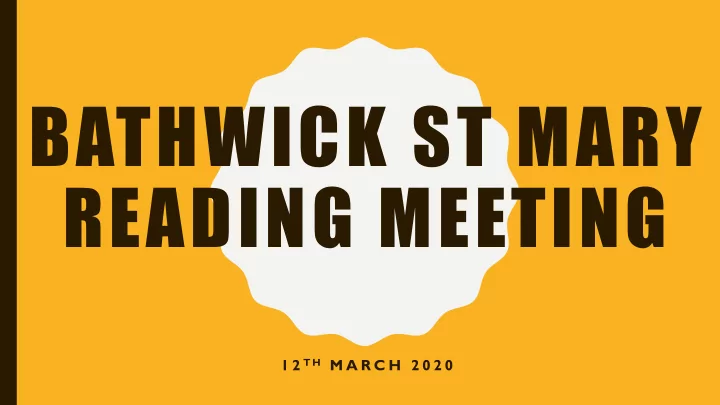

BATHWICK ST MARY READING MEETING 1 2 T H M A R C H 2 0 2 0
Aims: 1.Share our vision and approach to reading at Bathwick. 2.What do we do across the school to teach and celebrate reading. 3.What you can do at home.
OUR VISION Children will leave Bathwick and be ready for a life long adventure with reading. We want to inspire our young children to want to read even when they have left us in year 6. In addition, we are responsible, along with the children and their parents, to ensure they are taught the skills needed to be able and confident readers. Most importantly, we want to give the children the opportunity to read from the best and most inspiring books.
The importance of reading. • It helps children learn about the world in which they live. • It is a key skill that is needed to do well and progress in all other subjects. • Children learn how language works. • Children develop a love of reading. • It helps their imagination. • Good writing starts with good reading.
The National Curriculum 2014. 2014 National Curriculum sets out expectations for what children are meant to achieve at the end of each year and particularly at the end of KS2 (year 6). Everything we do is guided by both these requirements as well as trying to give the children a love of reading. Class teachers may share year group expectations in more detail.
What do we do to teach reading at school?
Reading – phonics, spelling and decoding. EYFS and early KS1 – focus on learning of phonemes and graphemes through rigorous teaching of phonics. Children also introduced to ‘tricky’ words that they must learn to recognise and read (and spell) in each year group. Our reading scheme is designed to match this progressive teaching of phonics. Lessons will be daily with focus on phonics rules. Children will also apply these rules when reading texts in class and recognise words which fit into phonic rules and those which do not (common exception words). Children are given spellings to learn each week – some phonics and some with different spelling patterns and rules. KS2 (and later KS1) – Continued teaching of phonics and spelling rules with greater emphasis on decoding and word recognition. Children may continue on structured reading scheme or be free readers allowed to read from their own book choices. Children will now rapidly increase vocabulary through targeted teaching of words and through greater exposure to longer texts. Children also continue to learn more spellings each week and make use of individual dictionaries to record words they need to remember.
Reading comprehension skills. Children will use the skills titled ‘VIPERS’ across the school. They will be built on with growing depth and difficulty up to the end of KS2. Children will be reading a wide range of texts to help them progressively build on these skills. They will also practise these skills with images and videos. As the children move through the school they will have to demonstrate these skills in weekly reading comprehension lessons and to give both oral and written responses to questions about texts.
What can we do at home? Find the right time to read with your children. Read, read, read! Share stories – read to your Model good reading children and habits – let the children choose stories see you read. together. Record all reading in the reading records Hear your children given to you by school read as much as – have books in school possible – however it each day. is not a race to get through the reading scheme. We want Find books that your children are interested in children to both and will inspire them to want to read – class decode and teachers can help with this and we have understand. Take many excellent books at school for children to time to ask questions. take home.
ANY QUESTIONS?
Recommend
More recommend